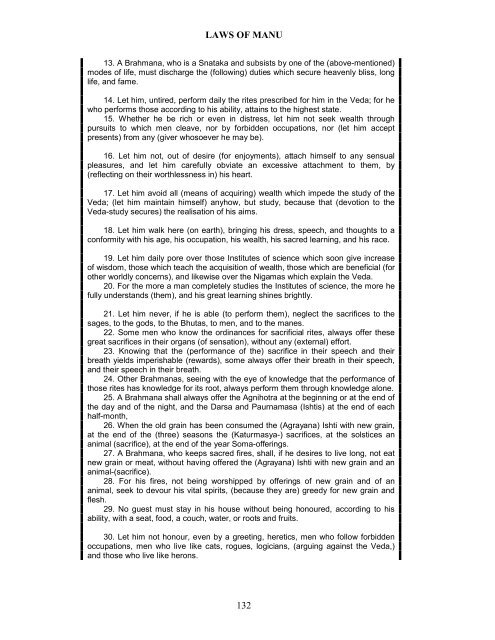You also want an ePaper? Increase the reach of your titles
YUMPU automatically turns print PDFs into web optimized ePapers that Google loves.
LAWS OF MANU<br />
13. A Brahmana, who is a Snataka and subsists by one of the (above-mentioned)<br />
modes of life, must discharge the (following) duties which secure heavenly bliss, long<br />
life, and fame.<br />
14. Let him, untired, perform daily the rites prescribed for him in the Veda; for he<br />
who performs those according to his ability, attains to the highest state.<br />
15. Whether he be rich or even in distress, let him not seek wealth through<br />
pursuits to which men cleave, nor by forbidden occupations, nor (let him accept<br />
presents) from any (giver whosoever he may be).<br />
16. Let him not, out of desire (for enjoyments), attach himself to any sensual<br />
pleasures, and let him carefully obviate an excessive attachment to them, by<br />
(reflecting on their worthlessness in) his heart.<br />
17. Let him avoid all (means of acquiring) wealth which impede the study of the<br />
Veda; (let him maintain himself) anyhow, but study, because that (devotion to the<br />
Veda-study secures) the realisation of his aims.<br />
18. Let him walk here (on earth), bringing his dress, speech, and thoughts to a<br />
conformity with his age, his occupation, his wealth, his sacred learning, and his race.<br />
19. Let him daily pore over those Institutes of science which soon give increase<br />
of wisdom, those which teach the acquisition of wealth, those which are beneficial (for<br />
other worldly concerns), and likewise over the Nigamas which explain the Veda.<br />
20. For the more a man completely studies the Institutes of science, the more he<br />
fully understands (them), and his great learning shines brightly.<br />
21. Let him never, if he is able (to perform them), neglect the sacrifices to the<br />
sages, to the gods, to the Bhutas, to men, and to the manes.<br />
22. Some men who know the ordinances for sacrificial rites, always offer these<br />
great sacrifices in their organs (of sensation), without any (external) effort.<br />
23. Knowing that the (performance of the) sacrifice in their speech and their<br />
breath yields imperishable (rewards), some always offer their breath in their speech,<br />
and their speech in their breath.<br />
24. Other Brahmanas, seeing with the eye of knowledge that the performance of<br />
those rites has knowledge for its root, always perform them through knowledge alone.<br />
25. A Brahmana shall always offer the Agnihotra at the beginning or at the end of<br />
the day and of the night, and the Darsa and Paurnamasa (Ishtis) at the end of each<br />
half-month,<br />
26. When the old grain has been consumed the (Agrayana) Ishti with new grain,<br />
at the end of the (three) seasons the (Katurmasya-) sacrifices, at the solstices an<br />
animal (sacrifice), at the end of the year Soma-offerings.<br />
27. A Brahmana, who keeps sacred fires, shall, if he desires to live long, not eat<br />
new grain or meat, without having offered the (Agrayana) Ishti with new grain and an<br />
animal-(sacrifice).<br />
28. For his fires, not being worshipped by offerings of new grain and of an<br />
animal, seek to devour his vital spirits, (because they are) greedy for new grain and<br />
flesh.<br />
29. No guest must stay in his house without being honoured, according to his<br />
ability, with a seat, food, a couch, water, or roots and fruits.<br />
30. Let him not honour, even by a greeting, heretics, men who follow forbidden<br />
occupations, men who live like cats, rogues, logicians, (arguing against the Veda,)<br />
and those who live like herons.<br />
132


















